Psycho-Pass: The Ethics of an “Ideal” Society
Psycho-Pass presents us with a fascinating concept: a society where everyone’s emotional and psychological state is carefully measured by a system, which then determines their aptitudes and mental health. The society we are shown is utterly dependent on one system, with everything from career choices to criminal judgment placed in the hands of the Sibyl System. Primarily, Psycho-Pass explores the latter, investigating how such a society deals with the ethical issues surrounding crime by exploring how various characters interact with the system. Each character brings their own perspective on the Sibyl System, and through them we learn more of the benefits and flaws of the society they live in. Be warned, this article contains spoilers for major plot points.
The Sibyl System and Utilitarian Order
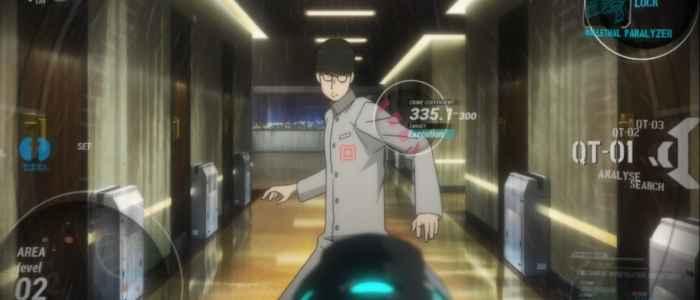
The Sibyl System represents a branch of ethical philosophy known as Utilitarianism, which states that an action is ethically correct if it causes more good for society than bad. For example, the Sibyl System judges whether each person is likely to commit a crime, and uses that assessment to decide whether they are safe to leave in society; if not, they are removed for therapy or executed. While this is obviously bad for the individuals, society as a whole benefits enough from not having criminals on the streets to outweigh the negative effects on those few people.
The practical implementation of this philosophy is through something known as a psycho-pass. A person’s psycho-pass is a record of their mental state, including their Hue, which is a measure of their current stress level, and their Crime Coefficient, a measure of their likelihood of committing a crime. People regularly receive “cymatic scans” by scanners placed in buildings and on the streets, which is then processed by the Sibyl System to update their psycho-pass. When a cloudy hue is detected, the police are dispatched to detain the individual and take them to therapy. The Sibyl System is also used to judge people’s work proficiencies, effectively determining which careers they can pursue.
However, the Sibyl System raises a lot of ethical issues. For example, if someone’s crime coefficient is above a certain number, Sibyl will order their execution regardless of whether they’ve actually committed a crime. Is this sort of preemptive judgement fair? What if Sibyl makes a mistake? What if a person has a high crime coefficient but is also very valuable to society? Each of the characters in Psycho-Pass poses their own challenges to the Sibyl System.
Kogami and Hammurabi’s Code
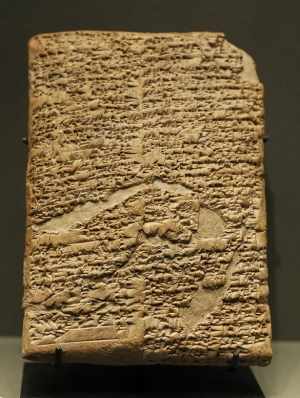
In the year 1754 BCE the ruler of the ancient kingdom of Babylon wrote and passed into law what is now known as Hammurabi’s Code. The basic concept embodied by the Code is the idea of a proportional response to crime, encapsulated by the well-known tenant “Eye for an eye, tooth for a tooth”. The idea is that any crime should be dealt with by inflicting punishment of the same nature and magnitude as was inflicted upon the victim. This line of thinking is the sort that completely justifies killing to avenge a murder, and therefore becomes the line of thinking adopted by Shinya Kogami after the gruesome death of his friend, Sasayama, at the hands of Makishima Shougo. Although the rest of the time he makes no objection or resistance to the Sibyl System, when it comes to a matter that is truly important to him Kogami decides to defy the System in favour of revenge.
This defiance is more than a simple act; it represents a fundamental rejection of the Sibyl System as an effective arbitrator of justice. By deciding to pursue vengeance instead of allowing the Sibyl System to administer justice, Kogami is asserting that he doesn’t believe the System is capable of coming to the right conclusion with regards to Makishima. When it mattered most to him, Kogami did not support the System, but instead struck out and followed his own code of ethics aligning with Hammurabi’s code. This, of course, is the cause of his fall.
Ginoza, the Mirrored Reflection of Kogami
Inspector Nobuchika Ginoza is, in many ways, a very similar character to Kogami. They joined the police force at the same time, they work closely together, and many times they seem to think along the same lines. They are equals in detective ability, although Kogami is more effective as he isn’t limited by a desire to maintain his psycho-pass. The two characters are parallel – the same but on different paths. Ginoza is who Kogami would have been had he not fallen, and Kogami is exactly what Ginoza is trying hard to avoid becoming. However, Ginoza fails. He falls in the same manner as Kogami, becoming too wrapped in the investigation to deal with his rapidly deteriorating psycho-pass. He refuses therapy in the interest of pursuing justice, which is exactly what Kogami had done before him.
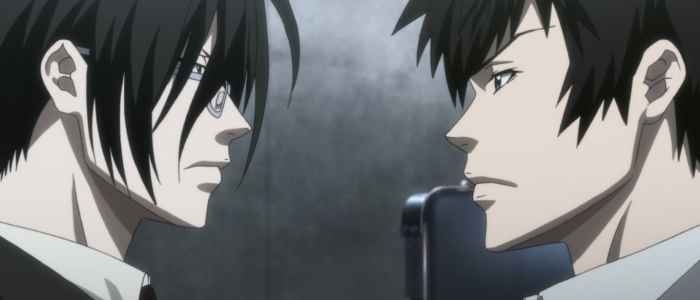
If the two characters are meant to be the same character following different paths but both of them fall, then this raises an interesting question: were their falls inevitable? If both paths led to the same place eventually, was there any way that either of them could have avoided this fate? And if not, why would the Sibyl System deem them capable of performing the role of inspector? While undoubtedly both are excellent detectives, neither seems to have had the mental capacity of doing the job and maintaining a clear psycho-pass.
Furthermore, each is far more capable of doing their jobs as an enforcer. The role of inspector hampers their abilities. In the earlier episodes, it is almost always Kogami who solves the case; he unraveled the mystery of Spooky Boogie, he uncovered the identity of Rikako Oryo, and he was the first one down the trail after Makishima, while Ginoza did little more than sit back and watch. However, it’s not because Ginoza is less talented than Kogami, but rather because Ginoza is hemmed in by his role and its psychological demands.
This would suggest that no inspector can be competent and psychologically clean. As Masaoka says, “Now there are Enforcers, but before they created that position, there were many detectives who were diagnosed as latent criminals like that.” This is a common, almost inevitable occurrence, so why doesn’t Sibyl take that into account and do more to keep the inspectors from falling? The answer lies in the fact just pointed out; enforcers are more capable of doing their jobs than inspectors. Kogami, Ginoza, and probably many others are wasted as inspectors. Their talents can only be used if they have the freedom of thought available to enforcers. Because of this, the Sibyl System not only lets them fall, but actively desires their fall so that they can be of more use to society. The role of inspector, therefore, is not superior to that of an enforcer, but rather a stepping stone towards it.
Masaoka, the Nice Old Traitor
On a similar note, we come to the case of Tomomi Masaoka. When he is discussing how he came to be an enforcer, he explains that he was essentially just too late in accepting the Sibyl System. Other than that, he is mild-mannered and kind. It’s hard to imagine him as a dangerous criminal. His mind is too stable to be at risk of a passionate crime, so is his only crime is that he is capable of independent thought from Sibyl. While it’s conceivable that allowing too much dissenting thought might be a threat to social order, is it truly necessary to limit someone like Masaoka? When does maintenance of social stability become repression of free thought?
It’s possible that the Sibyl System isn’t capable of handling cases like Masaoka’s properly. For all its brilliance, Sibyl is shown several times to be a less than perfect system. Perhaps, then, Masaoka is simply an unfortunate casualty of error in the still-improving Sibyl System. However, this logic seems awfully convenient, and even flawed when one considers that the Sibyl System does have consciousness. The Sibyl System, though it bases it’s decisions on scientifically and logically sound grounds, is capable of overriding its own rules, as shown in the last few episodes. It seems likely, then, that Masaoka is determined to be a criminal because of a choice by the System rather than by mistake.
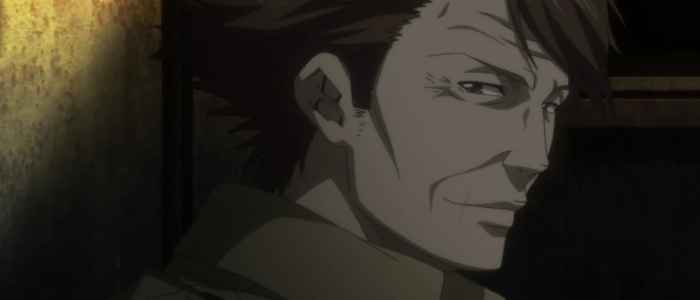
Makishima, the Free-Will Philosopher
Makishima Shougo has a unique point of view of in the show. The Sibyl System represents a branch of ethical theory known as consequentialism, in which the only factor taken into account when determining the ethics of a situation is the end result. In other words, the correct decision is the one with the most favourable results. Makishima opposes this, instead choosing to believe that a decision only has importance because of the motivation and will of the person deciding, an opinion that is much more representative of virtue-based ethics. Of course, Makishima’s “virtues” are not very virtuous, but the idea behind virtue-based ethics is that one should act according to what they think is right, regardless of the consequences.
To quote the man himself:
“If the system possesses the power of life and death over you… you’re no longer a human. You’re livestock. No matter how hard a rancher tries to pretend otherwise, they never recognize their livestock as friends. It’s a mystery to me… How is it that these people, treated as livestock in this boring society, have not tried at all to destroy it?”
The idea that no one is willing to stand against Sibyl fascinates him. When analyzed, his actions are understandable; what he wants more than anything else is for someone to stand up to Sibyl as an act of will. Much like us when we root for the rebels fighting against the oppressive overlords, Makishima really just wants to have someone to root for against Sibyl. This is why he helps such terrible criminals commit their misdeeds: they are the only ones who are willing to defy Sibyl. However, the criminals keep showing him that they lack the higher purpose of resistance to the System and are instead motivated by vanity, such as Rikako Oryo, or by shallowness, such as Masatake Midou. Hence, he disposes of them.
This entire article could be about Makishim, but it isn’t, so let’s move on.
Akane, the One Who Chose
The first episode of Psycho-Pass begins with Akane joining the Public Safety Bureau. She, like us, has very little idea as to how the MWPSB operates, and therefore serves as a stand-in for the audience by asking the questions we have about the world we’re being shown. However, it would be a mistake to assume that her only role in the show is as an audience surrogate. Akane’s perspective is distinctly from our own. When we watch Psycho-Pass, we bring with us all of the ingrained assumptions that our social structure is based on. Akane has her own assumptions which are distinctly different from ours. Akane grew up in a society completely structured around the efficacy of the Sibyl System, and with that comes an underlying faith in the Sibyl System. We all like to think that our own social structure is the best one, and Akane is no different. Akane, then, is valuable not because she represents how we feel about the society in Psycho-Pass, but rather how we would feel if we were living in it.
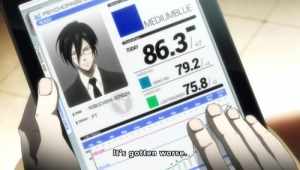
This faith in the System is made evident by her surprisingly stable psycho-pass. Even at her most stressed, when she is reliving the death of her friend before her eyes, her psycho-pass never gets worse than a 79. When you consider that Ginoza is regularly at that level (his psycho-pass is 86 when he sees his therapist), her levels seem astonishingly low. Now, part of this can be put down to her stable disposition, but a large part of it is also explained by her naïve faith in the system. She doesn’t always agree with the decisions of Sibyl, but it is apparent in her conversations that she truly does believe in the system, mentioning how someday the enforcers might be treated differently. To use Masaoka’s words, “She is, how should I put it… She accepts things as they are. She forgives society, acknowledges it, and accepts it.”
That said, she doesn’t always agree with Sibyl’s judgement. From the very first episode, where she shoots Kogami to prevent him from carrying out Sibyl’s orders, to the end of the season, when she convinces Sibyl to override her Dominator so the safety is always off, Akane continuously challenges the decisions of the Sibyl System based on her concept of right and wrong. Of all the characters, Akane’s strength in her convictions is equaled only by Kogami.
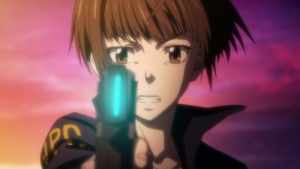
This culminates to a dramatic decision for Akane at the end of the season. She has the true nature of the Sibyl System revealed to her, and she has the chance to take action against it. If she were to reveal to the world the true nature of the Sibyl, she would present an existential threat to the system. In effect, this gives her the power to take down the Sibyl System, should she choose. However, in an act that has sparked controversy among fans, she decides not to act on the information she is given. Through a series of flashbacks, she weighs the argument against Sibyl. A conversation with Makishima helps her realize that free will is an essential part of living a meaningful life. She also comes to the conclusion that The Sibyl System, because of its utilitarian outlook, has a notable flaw in regards to itself and Makishima. Both have committed crimes against humanity, but because their value to society far outweighs this, nether is punished for their actions. Despite this, other than relatively minor acts of defiance, such as bartering for Kogami’s life, she goes along with Sibyl’s plan.
This decision is not one that many people seem to understand, as it is obvious for us (with our strongly held social values of freedom and democracy) that such a system is inherently immoral and unethical. But is it? By all accounts, the vast majority of the people under the system manage to live happy, productive, and fulfilling lives because of the system, not despite it. Though cases like that of Masaoka are unfortunate, they are comparatively rare. No system is perfect, even the Sibyl System, but that doesn’t mean that the Sibyl System isn’t the best option available. When making her decision, this is the conclusion that Akane comes to; Sibyl isn’t perfect, just better than the alternative.
Ultimately, the question that the society of Psycho-Pass raises is whether the ends justify the means. Is it preferable to have a society that is prosperous and happy but based on a morally and ethically ambiguous system, or to have a system that is morally and ethically sound but is rife with crime and unhappiness?
What do you think? Leave a comment.


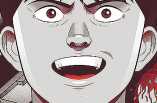

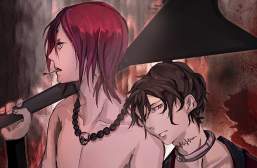


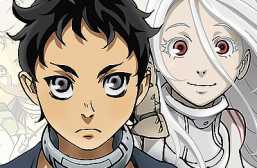
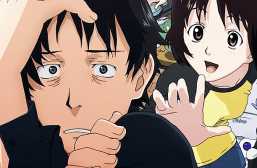
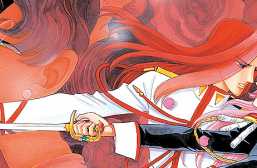
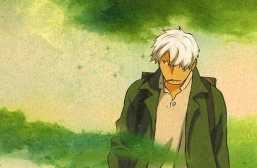
I read about this series when I looked up an article on Funimation’s broadcast dubs. Because I was curious and because I hadn’t checked out an anime in a while, I decided to check it out. I was absolutely MIND-BLOWN. This was a series that really forced me to rethink about the difference between good and evil, as a lot of the characters, even the villain Makishima, weren’t at all black and white. Three of the most memorable scenes were when Makishima slit Yuki’s throat right in front of Akane, when Kogami and Makishima fought, and when Masaoka died trying to protect Ginoza, his son, the latter of which almost made me cry (and it takes A LOT for a show to do that to me).
This is literally “Minority Report.”
To be fair, Philip K. Dick did write Minority Report Back in 1956. It’s more or less a staple of sci-fi. Borrowing from it is excusable, especially since Psycho Pass used the ideas it took to explore new themes. Minority Report played on the theme of predestination, and asked the question of how much of our fate is really in our own hands. (For instance,[spoiler alert] that one bit in the movie where Tom Cruise opted not to shoot the guy he was destined to kill, but then immediately found himself over the body holding a still smoking gun.)
Yes, and no.
It distracted me how some of the female characters (particularly Akane) had bigger eyes than the male characters
Grand article! For me psycho pass makes me think about my own ways. Would you allow others to choose for you what might be the best for selfless reasons?
Minority Report + Judge Dredd is how I would describe this anime. And its pretty awesome except for the middle which drags.
I’ve always thought the execution of criminals in the show is a little ridiculous… i mean…seriously. having something immediately killed via poisonous material as an example…rather than having somebody EXPLODE. because that will keep your investigators sane…yeah, blood, torn muscle, and organs. good job nearly having to execute a citizen that got raped and witnessed said rapist literally burst out of his skin and explode; cause that won’t cause PTSD, no. never.
I think at some point you’ve got to forgive the creators a little dramatic leeway. I mean, yeah, they overblow the executions for no real reason, except “entertainment”, but that’s unfortunately what happens in anime.
This show reminds me of the game Deus Ex: Human Revolution mixed in with Ghost in the Shell. I really liked it.
I love the show. But the whole thing is making a Utopia. Which made it a unsafe world. It’s the same as The Hunger Games. These kinds of movies or shows made me frustrated. Especially watching Catching Fire. It’s on Netflix. I hate the society we have today though this just made it ten times worst.
There’s no real proof that the world of Psycho-Pass is more dangerous than our current world. We only see the bad stuff, the problems with the world, but there is good reason to believe that the world is actually a much nicer, safer world for almost everyone else. The whole argument behind Psycho-Pass is that life is far better for almost everyone, at the sacrifice of a select few. Is that acceptable? Well, that’s what you’re left to determine.
You do raise an interesting question about the worth of a select few if it will benefit the lives of many, but the context is where it may get a little complicated. In psycho-pass there are many more victims than we care to think; those incarcerated, the victims of circumstance who were killed, those who were in a comatose state because of overdose, etc. and all because of the Sybil System. It’s so hard to say when it comes down to it because many of these people who get sacrificed for the sake of a “better” society are victims.
In many other anime’s there are heroes who commit to the whole “I shall never kill anybody” ideal, and sometimes this harms innocents as well. Think of Batman and his ideal to never kill when it comes to the joker; the Joker is only going to escape Arkham and kill more people each time he escapes. In this case, I put the blame on the hero who sticks to his somewhat selfish ideals to save all lives when in the long run so many people are going to die because of that.
Because Psycho-Pass isn’t like that, I’d argue ending these lives isn’t something to just get past for the sake of other lives. There isn’t just death involved; it’s faulty imprisonment, overdose, general oppression, so on and so forth.
i just started it , for a sci fi anime show its very well done , every show has flaws but it was really good for what it is , i would love to see more seasons and episodes to explore the other characters and villains,
Don’t watch the Psycho-Pass 2. I mean, it wasn’t that bad but it put shame to the first season (if you enjoyed Psycho-Pass)
Ghost in the Shell and Ergo Proxy brought me to Psycho Pass.
Fantastic Post. As someone who’s watched everything Psycho Pass I highly recommend the first season as well as the recently made movie. The season season, Psycho Pass 2, however you shouldn’t watch. It was made by diffrent people then the first season due to them being busy with the movie at the time PP2 was in the making. It’s not even half as good as it’s 1st season because of that (plus it was mostly just a filler to keep people interested in the show while the movie was being made) It seemed like the people who made PP2 where just trying to copy the first season in just 11 episodes. So yeah. In my opinion there’s really no reason to watch PP2 since it has nothing to do with the movie. So if you’re planning on watching the movie and you haven’t seen season 2. Don’t worry, you don’t need to know anything about Psycho Pass 2 to understand it
I haven’t seen Psycho-Pass 2, but I haven’t read anything good about it anywhere, so I think I’m going to pass on it.
I thought that this show was pretty good!
Me too I liked it.
Great post! Akane serves as a moral compass of all the main characters as the lines of morality she draws between following and defying the system may accord more with our sense of morals, not being in the society that Psycho Pass is situated in.
Makishima is probably the most interesting character for me given that his goal is one that is not common compared to stereotypical anime villains.
Frankly, I could have written the entire article about Makishima. I think he is that rare sort of anime villain whose motive is not just “I’m evil, and therefore I do evil stuff”. I think we too often default to unexplained evil for villains. I mean, you are going to get psychopaths and evil people, but it’s very unlikely that they’ll see themselves that way. They likely consider themselves to be correct and just. I wish more villains had true motive beyond just evil.
The only gripe i have with this anime is when chaos is happening in the city noone bothers to go stop them ,theres no team of police nothing ,theyr just like ok lets just have a meeting and let ppl die ,we’ll have the summit in an hour be ready while chaotic mass homicide is taking place ,idk its just stupid to me ,nd like when they were notified the armored truck was getting attacked they were taking their sweet ass time ,they should act like goddamn detectives nd cops shit lol ,other than that
I really liked this series. I was uncertain at first, but then I started it out of boredom and really enjoyed it.
So I saw first episode and as I watch this thing that pops in my was Minority Report. Which is not necessarily bad but I could just smell the comparisons from here. IDK maybe it gets better as I keep watching.
I’ve never seen minority report, but considering how often the two are compared, I believe that they are reasonably similar in certain respects.
This has got to be my all time favorite anime, I don’t now what it is about it but it’s just so awesome !
The show examines the very nature of the mind and baser human desires, making numerous heavy-handed comments regarding false judgment and true guilt in society as well.
The ‘Sybil System’ sounds like the micro-chip thing in Futurama
I loved Psycho Pass.
haven’t watched this anime, but now am very intrigued by the premise: sounds like something written by Ashirogi Muto
I just finished the psycho pass anime yesterday- I really loved Kogami(he is my one of my favorite characters now). The world did make feel it was a preview you off it… I didn’t feel that immersed in it. You got the feeling spot on. I spent the whole day deciding whether or not to recommend the series to my cousin who asked me about it.
i have got to say psycho pass first two openings are the best EVER. not only the art in them which are amazing but the songs are killer. 2nd, fairy tail first opening, and sao first opoening, then gurren lagann
Tokyo Ghoul’s “Unravel” puts most anime openings into shame. I also love “Rise” from GITS, Brynhildr in the darkness, Lain and all three Durarara openings (seriously, this anime is completely underrated).
Personally, my favourite is the opening to Steins;Gate. However, I think Future Diary and Pumpkin Scissors deserve a mention for their openings.
It sounds like 1984.
It is similar to 1984, but I think there’s one pretty clear difference; in Psycho-Pass, there is genuine moral ambiguity around the justification of the system, because the vast majority is happy under it, whereas the society of 1984 is clearly just selfish and terrible. Psycho-Pass raises questions while 1984 just makes a point.
I’m only on Episode 11, but I freaking love this series; what I enjoy most so far is the villains, and no I’m not talking about the main one shrouded in shadows, the ones that make up each episode; I love all the different M.O’s and their backstories prior to the murders too;
FANTASTIC article! What interested in the anime was the system It was sofisticated enough to decide what person does what and who goes where
the thing that made me sceptical about this show is the main character. They are kind of generic.. Kogami is an generic “lone wolf” literally! and the girl (hell i even forget her name after jsut finishing the show) has an aweful character development. It was more than hard to relate with her or feel sympathy while you still can feel for kogami.
The character who amde the show was the antagonist makishima. He was the one who ruled the fucking show and im not even interesting in the secound season because of the ending of season one. This show had too many logic holes and feels kind of forced in many moments. Like they wanted to be their creative and philosophical so hard that they made it look so out of place sometimes. This show isn’t bad but it is ok at best. The only real persons i cared of were this one inspector and his father. I would have loved if the show would have focused more on the antagonist and kogami than this littl wanna be girl.
I think the show suffers from being too technical, in that each of the characters is first and foremost a literary device, and only secondarily a character. In order for each character to have the most effect as a device, their characters were maybe simplified and made more generic than is really good. However, if one can look past that by focusing on the society and the philosophical issues, I think it’s not a huge problem.
I totally agree about Makishima though. That guy really makes the show.
The reason I enjoyed this show so much is because it never cheats (overtly misdirects) viewers but rather provides an abundance of exposition without being boring. Plot points are revealed naturally, even to the point where we know more than the characters, leaving us anticipating their response. In short, the show makes you want to watch more, and that’s why it’s my favorite anime since Cowboy Bebop.
The art style kinda reminds me of Tokyo Ghoul.
Is it bad that I wanted Makishima to win?
He wouldn’t be a worthwhile villain if you didn’t. Although, if you approve of his methods, then that might be cause for concern.
I love Psycho-pass season 1 to pieces. This isn’t the typical action-filled anime. Instead, it digs deep into the psychological aspect, which I love. The famous shounen anime like Naruto, Bleach, etc are at times are thrilling and emotional, but I find that they lack the dark psychological twist that make me rethink life. The characters have distinctive personalities that set them apart; most of all, they just feel so real, like human beings, not anime characters. The music here are just absolutely fitting and amazing. I ended up downloading many songs and listen to them on repeat. This is my most favourite anime as of late.
I love anime, but the characters can be so cliche sometimes. So can the plots.
I’d first like to congratulated for the excellently articulated article. The part about the role of inspectors potentially serving as candidates for becoming enforcers is an excellent one. It certainly explains, in part, why the MWPSB searches out the brightest in society. In a way, in reminds me of Brave New World, a book I’m sure Urobutchi is familiar of, where generally, alphas are assigned the most intellectually challenging jobs, and specifically, the deviant alpha, Mustafa Mond, is employed as a world controller dedicated to sustaining the system.
If I can critique anything though, I’d critique your point on Kogami and Hammurabi’s Code. Kogami is frustrated by how the Sybil System operates, I’m sure, but I don’t think that Kogami would necessarily advocate for society to return to a system based on “eye for an eye” rules. He sympathizes with Akane’s stance of what justice ought to be, but his quest for Makishimi’s destruction seems to be born more out of personal selfishness than anything else.
Thank you for your comments.
To explain my connection of Kogami with Hammurabi’s Code, which I maybe didn’t articulate quite as I intended: Kogami personally rejects Sybil’s utilitarian justice in the context of his own actions. Basically, he decides that those rules do not apply to him. However, I would agree that he does not desire or advocate for Hammurabi’s ideals of justice in society, which is why he continues to act as an enforcer. He makes no rebellion against the system when it comes to others; when it is him, though, he ignores it.
I don’t understand why so often people treat the Sybil system like it was somehow different from the system we live in. It may not be so present around us, but the criminalization of people with psychiatric conditions (in the sense that they’re locked up and forced to therapy or to medicate themselves because they could be “a danger to themselves or the society”) shows us that we follow this line of utilitaranism just as much as the anime. The show strikes us as something so horrible but at the same time aren’t we judging individuals before their crimes so that we can maintain an aura of harmony?
I really loved watching Psycho-Pass and it was great to read such a detailed and well-put article. Just the point you made about Enforcers made me think. I think rather than Sybil trying to make Inspectors fail, both Enforcers and Inspectors are the most efficient way to deal with the overall situation (you made this point about something else in your article, Sybil chooses the consequences over process itself). System needs a branch to control society’s Psycho-Pass and deal with the ‘extreme’ situations. Of course it’s the dirtiest job of all but system puts effort to bring up the Inspectors and the best way to use their potentials they already have concerning the job is to use them in the same field while keeping them under control. It’s also reasonable because since their Psycho-Pass are already tainted, it will not matter because they are already disposable. Therefore, I do not think they are desirable because they are more free-thinkers than the Inspectors, I also do not deny that thinking out the box doesn’t bring you any advantages but this is not the actual reasoning behind Sybil’s judgement here in my opinion.
Saying that Enforcers are more successful doing their jobs than Inspectors may be the viewer’s opinion and viewer’s own understanding of success because success or ‘judgement’ for Sybil lies in the Dominator, if you pull the trigger in the right time and think nothing else, you are successful enough to maintain public order.
I don’t know why people diss second season this much, I thought it was good and had intriguing questions just as much as the first. Though, since you haven’t watched it, it was irrelevant of me to comment about it. ^^’
Thanks again for the post!
Thank you for your comments! I think one of the reasons I really liked this story as a dystopia is because of its consistency in how dispassionate the Sybil System is. It is a system that does not care about the individuals but cares a lot about society as a whole. There is a lack of animosity in system that I appreciate.
I loved this anime. I liked how it started off as a crime of the week type show, then focused on a bigger plot. I was torn about whether I agreed with this crime system or not. Like in minority report, they ultimately were able to stop majority of crimes. But, again like in minority report, there are flaws. The future can change, people’s motivations can change, and, their psycho-pass can change. That wasn’t taken into consideration or just was covered up so people accept this system without overthinking it. As long as majority of people could live in safety, why question it? I thought the whole series was very though-provoking, and I love psychological anime.
The character parallels are especially interesting considering how different Akane was during the first season compared to the second season.
Your article brings up very interesting points about Psycho-Pass and its controversial society. I always found the thought processes expressed by the characters in this anime were interesting.
I think part of the success of the philosophical workings in Psycho-Pass is that it weighs the judgment on all sides to a point where a rational person could easily make the decision that the Sybil System does create enough order that the benefits outweigh the costs.
I’ve only watched the first two episodes. the fictional world is brilliant and well-developed. The themes are relevant and concise. Though I’m not the most ardent lover of some of the characters, I love the theme song too much to care. Hopefully the characters develop a bit more and this’ll soon be one of my favorite animes.
This was one of the first animes I watched, and I was intrigued by its social commentary. I really enjoy your comparison between Kogami and Ginoza in this article.
Though I loved Makishima as a villain and the relationship between him and Kogami, the ending of the first season was just really inconclusive to me, mostly because we don’t see their final scene together. It also made Kogami look like the kind of ‘I’m just out for revenge’ character. I probably need to rewatch the series to develop a better analysis, but Kogami seems more like the antagonist because Makishima actually cared about society while Kogami only wanted vengeance for his friend.
I’m pretty sure you actually have it right. The point of this show is to challenge our underlying assumptions about ethics. Kogami is out for revenge, and to many he seems justified because Makishima killed his friend in cold blood and completely did not regret it. Most of us would agree that Makishima was wrong to do this, but a deeper look suggests that maybe Makishima is justified in his killings because of the result he is trying to achieve, the liberation of society from Sybil. Although, whether that is a desirable result is also up for debate.
I do agree that it would have been nice to have Kogami stand for a little more than revenge in the end of the season 1, but I’m not sure it would have worked any other way. That was Kogami’s role, and while it is a little unsatisfying, it maintains the thematic integrity of the show.
The case of Makishima remind me of Kira. I really loved him, his philosophy of life, everything about him… he’s my favourite character after all.
Psycho-Pass is hands down one of the best Anime out there: from artwork to plot it’s brilliant and nearly flawless. The characters are authentic and not cliche, which is a breath of fresh air compared to the surge of rather ‘crappy’ anime that seems to be overflowing and bubbling all over the surface. I did watch the show over a year ago so I don’t remember some of the finer details, but I do recall having what you might call ‘feels’: psycho-pass was scary, enticing, memorable, and highly emotional – proving once again that no system is perfect and no order or structure are obsolete.
Another thing that I wish to comment on is the Kogami – Ginoza similarity you mentioned earlier: I don’t recall them being all that similar to each other but perhaps I need to re-watch the show once again (that is if I want to subject myself to all these feels yet again).
Bottom line is that we need more clever shows the like of Psycho-Pass. Season two was for some reason less impressive, not to mention that I really missed the highly likeable villain Shogo Makishima.
This was brilliant. Although the show explains itself relatively well, this is really an exceptional summary of the over-all themes. You drew some parallels that I didn’t even notice. My only qualm was the choice to put Shinya Kogami’s name like this and then flip it for Shogou Makashima. I understand the Japanese order of sir name but as they say it in the show, I think you should put Makashima last. I really enjoyed the ebb and flow of the article. Fantastic work my friend.
This is my show, I love anime series like these where you get a great concept story telling series along with top notch animation details. Watching anime like this and Ghost in the Shell or even Death Note where the human behavior/morals are being expressed. I enjoy these type of anime’s the most when they pertain towards philosophy, Sci Fi, and other interesting works of genre.
THis is seriously my favorite anime and uggghhh i just love it soo much.
Really compelling read! Loved the show, but you made some excellent points that I hadn’t thought of before.
Also think about the artists and musicians that were deemed social deviants by the Sybil System—the system as a whole inhibits any sort of out of the box thinking whether it be good or bad. In Yayoi’s episode we see a band who wasn’t “regulated” by the Sybil system and therefore it was bast not to even get acquainted with them. Or the artist and the many others who medicated themselves into a comatose. While I do believe that Akane made the overall correct decision in the end, I also think the fact the system goes a little deeper than just those who have the potential to commit a crime get caught.
It’s also seen that the Inspectors are supposed to do regular checks in with a therapist; not much help at all in this society but I think that somebody must have thought it was a good idea to keep Inspectors under control.
I enjoyed your post, by the way. Psycho-pass and sociology are some of my favourite things.
What seems particularly interesting about this article, and the show, is how the trope of ethical ambiguity and utopianism is expanding within global culture. Think Hunger Games, Psycho Pass, Deadman Wonderland, etc. What material conditions are giving rise to this? And are these conditions global? They seem to be. So I’m very interested in exploring that phenomena. As some of the comments suggest, this is not a new phenomenon (Philip K. Dick in 1956, Robert Heinlein in 1939, etc). But why is it becoming integrated into our mass culture now? What do you all think?
I think your interpretation of the end is actually a little off. She doesn’t determine that the Sybil system is the best option. She determines that it is the ONLY option available at the present time because there is literally nothing to replace it with. Her eventual goal is clearly to remove, or replace the Sybil system. And it’s pretty clear that people aren’t living “happy and prosperous” lives, as you surmised. Shots of public areas almost always linger on the faces of deadpan, sickly looking people who are struggling with life. Pharmaceutical companies are seen exploiting people through “hue-clearing” drugs. There is very little that would suggest that the Sybil system is capable of more than the absolute minimum required to keep society functioning. Yes, that is better than the chaos that would ensue if it was removed without a replacement justice system, but it is, by no means, a valid option for any human society long term. This isn’t a morally and ethically ambiguous system, it is a morally and ethically bankrupt system.
I really liked this post up until that conclusion. Really not sure how you reached that conclusion.
This is a good article. I like how you went in depth in to each character and which values they represent. One thing though; I would not consider Makashima philosophy as virtue ethics. He is very clear that what he cares about is the free decision of the will, not acting from certain motivations or character traits. In that sense, I would consider Makashim as a kind of existentialist. The only thing that matters for him is the free exercise of the will to act against rationality and nature. He even says it himself, there is no way for someone’s action to be good or bad unless that action is the product of the unconstrained human will. I think Makashima would agree with Sartre that humans are radically free.
You forgot Kagari. He was labeled as latent criminal at the age of Five with no chance to become a normal citizen anymore. At such young age people still develop A LOT and it’s ridiculous to judge a person’s future and personality at the age of Five. How can Sibyl know what kind of environment he will experience? How can it know which events will shape him and make him develop as he grows to become an adult? Sibyl basically rejected any potential nurture offers and went straightly by nature. But humans are a sum of both. Every psychologist knows how much potential nurture has in young life. Sibyl rejects any kind of possibilities and goes straight with the least risks. But Kagari had high chances to become a normal and orderly citizen if he had the chance to get the right environment to grow up. Which Sibyl could’ve done easily giving how much power it has. Kagari could’ve been a normal citizen. That was pure rejection of any kind of potential and most importantly: the power of nurture. Sibyl doesn’t think ahead in its judgement. The judgement is for exactly this frame of time. And even less does it calculate possibilities. It only calculates risks. That’s the only time it thinks ahead: If the risk is there. Remember episode 1 with that woman that almost got raped? Her Psycho Pass at one time was over 300 and Kogami almost killed her if Akane wouldn’t have stopped him. Later she visited therapy and became a normal citizen again. Sibyl never analyzed why her psycho pass was that bad at that time. It just judged through a scan. It took a photograph. Sibyl says people with a Psycho Pass over 300 crossed the line forever, without any chance to become healthy again (hence they get killed) yet this woman did exactly this. Sibyl wants to judge humans but seperated itself from any kind of humanity. Ironical isn’t it?
This is an absolutely marvelous article, I enjoyed reading it immensely, not least because Psycho-Pass is one of my favourite anime and just an all-round incredibly story. Thank you!
From what episode is Makishima’s quote?